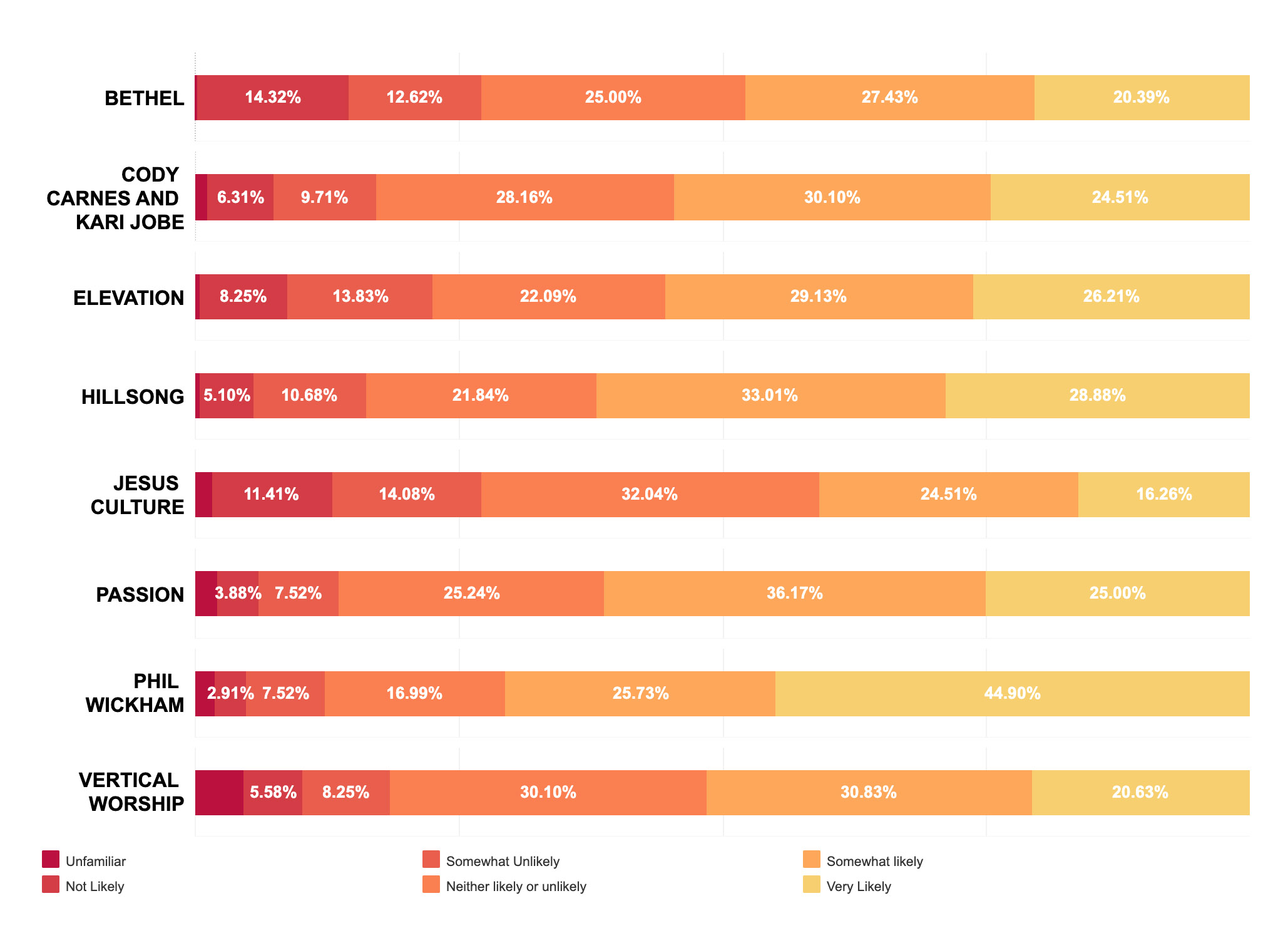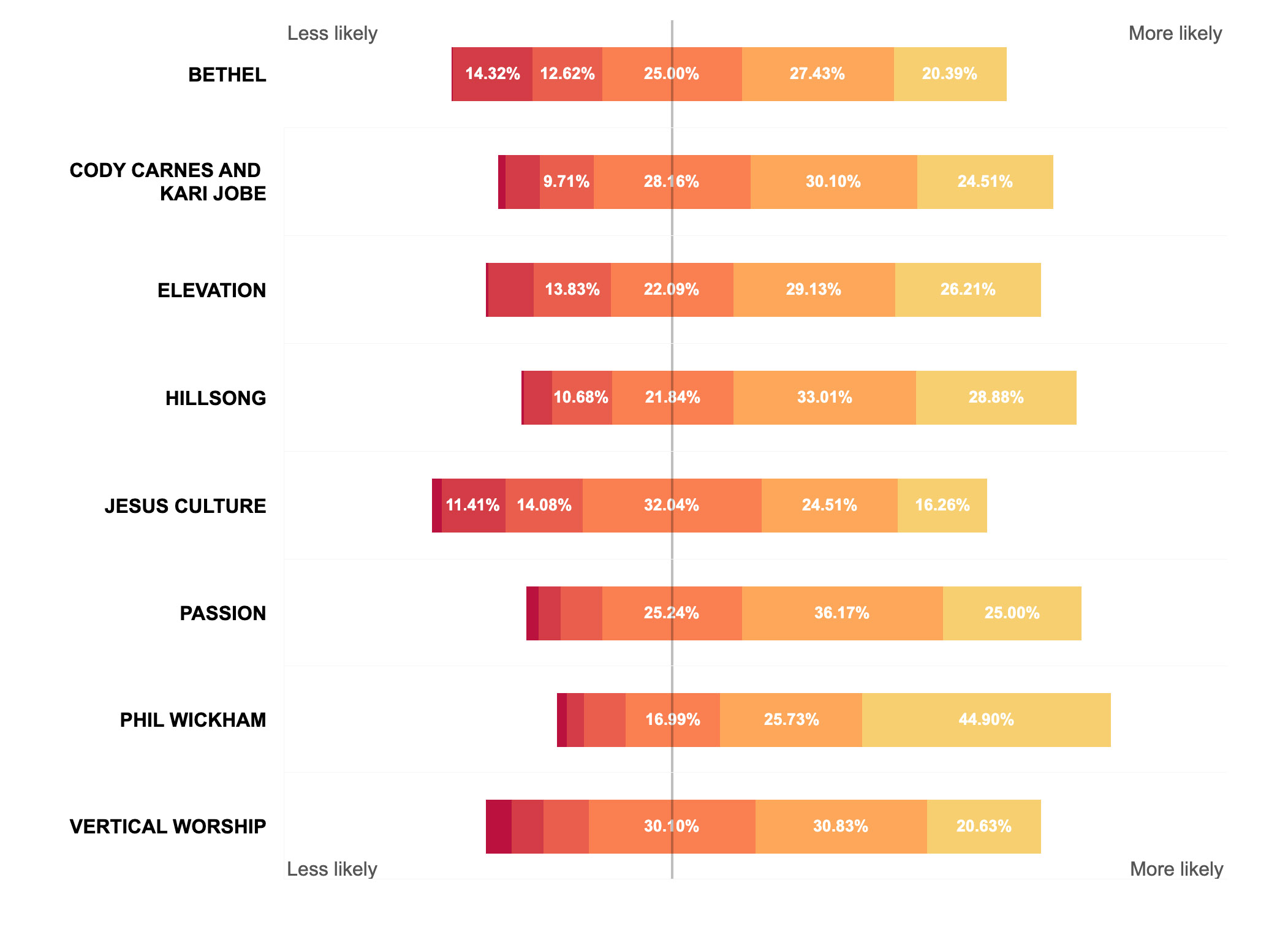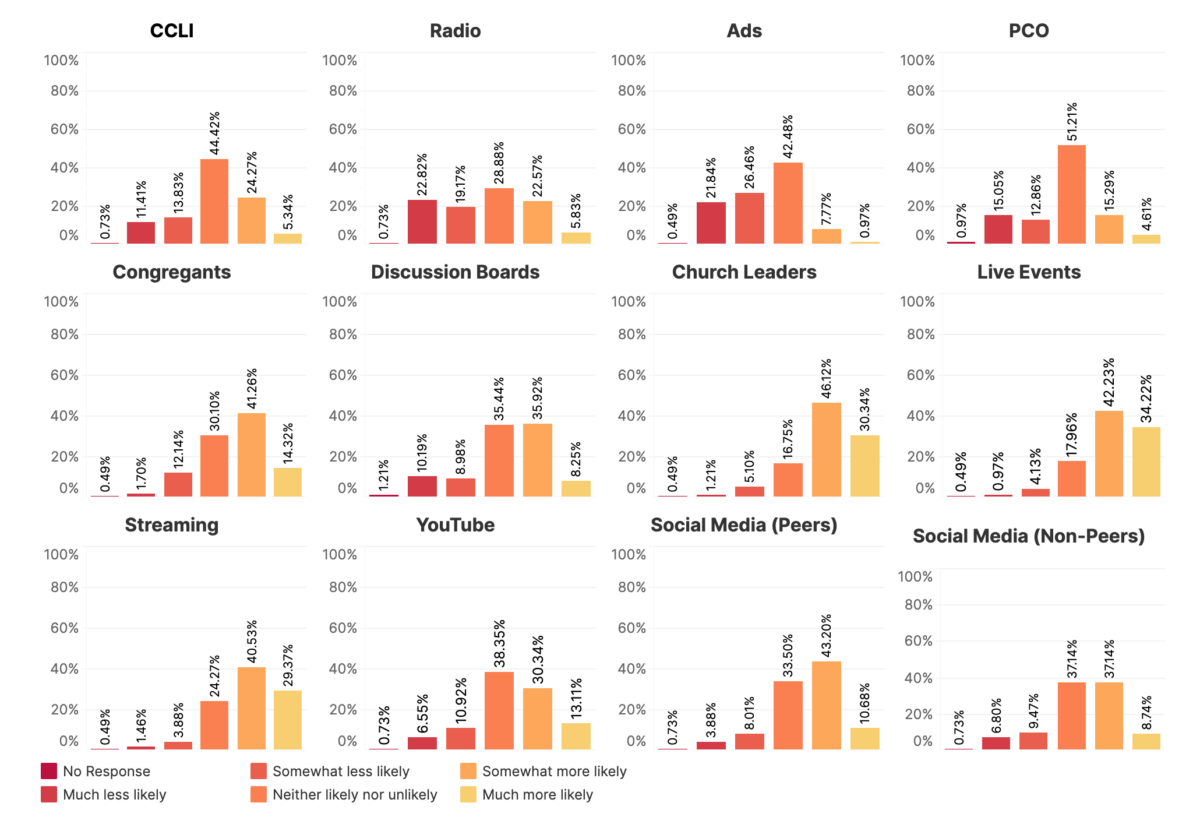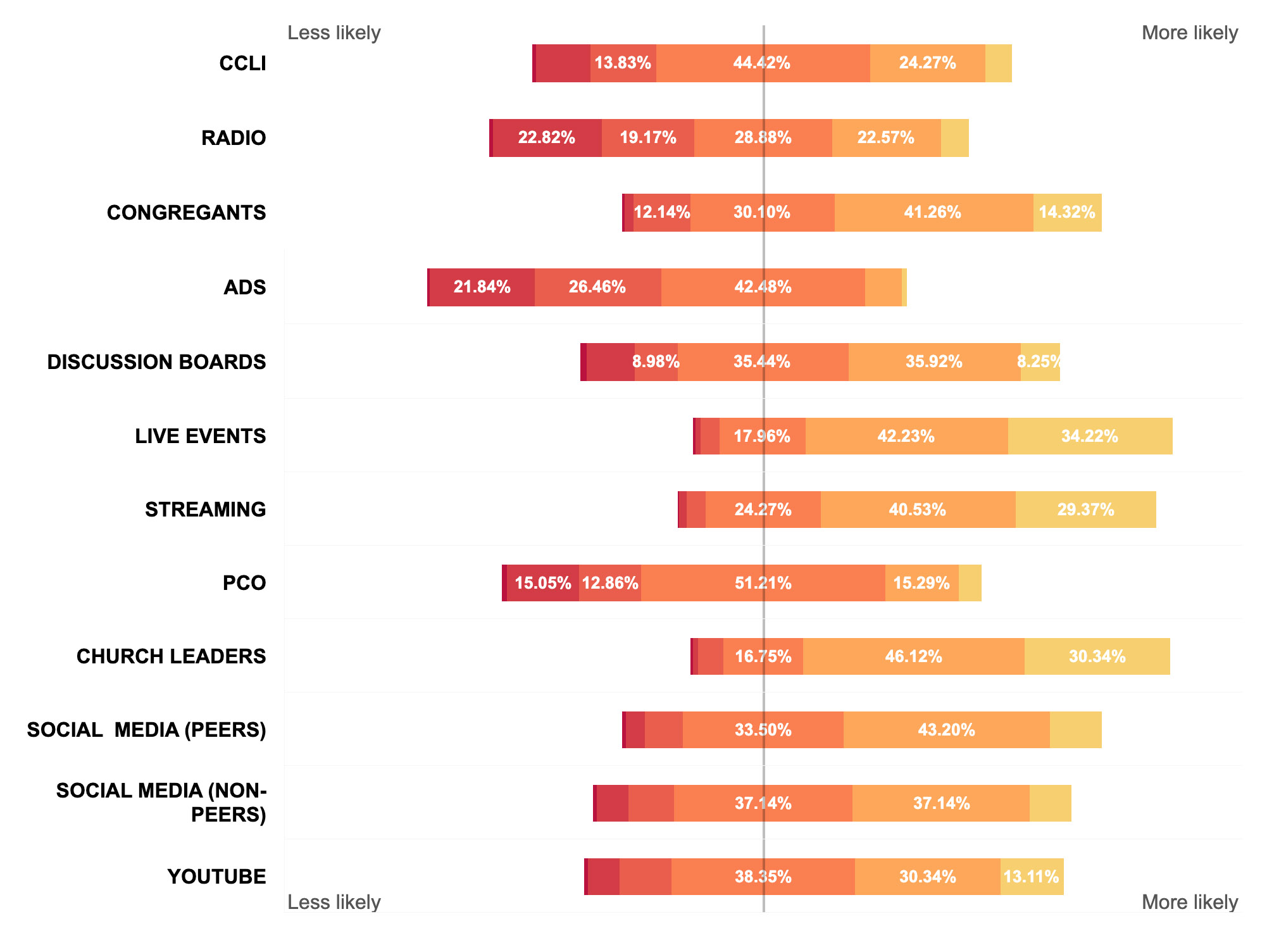Survey Background Information
How do worship leaders feel about the industry surrounding the songs they sing?
In the Fall of 2022, the Worship Leader Research (WLR) team surveyed worship leaders’ attitudes toward various aspects of the worship music we sing. The survey was publicly circulated from October to November 2022 within major worship leader Facebook groups, on Twitter, and via email (in partnership with Integrity Music). It was composed of six questions and provided respondents with opportunities to offer clarifying comments to their answers. Over 400 worship leaders responded to the survey, representing many worshiping traditions and demographic categories.
This survey represents Phase 2 of WLR’s contemporary worship music study. It builds on our initial research, which identified dominant music sources and artists. What follows is a visual depiction and analysis of the thoughts and attitudes associated with a representative sample of worship leaders. It reveals their views about the landscape of contemporary worship music today.
Below are the summary findings from this survey. You can explore the survey responses in greater detail, using demographic filters (including gender, age, church size, and denomination), by clicking “Exploring the Data.” In the coming weeks and months, WLR articles will further explore what these findings might mean for the Church.
Survey Demographics
412 worship leaders responded to the survey, representing many worshiping traditions and demographic categories.
Quantity of New Songs
Every week, streaming services and social media platforms promote dozens of new worship songs released by popular artists. Despite much discussion on popular forums, there is no agreed-upon definition or category to clearly distinguish whether a worship song is intended for individual or congregational use (or both). Regardless, the number of new songs released and available to worship leaders each week is incredibly high.
Question 1
How do you feel about the number of new songs promoted for congregational use?
As WLR revealed in a previous article, the amount of new songs available to worship leaders is vast. With 40-50 new songs released annually by the Big 4, alone, it is not surprising worship leaders consider the number of new songs as “a bit much.” This could reflect the worship leaders’ limited time and resources to evaluate new songs to add to their church songbooks.
Importance of Song-Artist Associations
Listeners tend to associate songs with the church or artist who created a popular recording of a song. It is often assumed these associations are essential for positively and negatively informing which songs a leader selects for corporate worship in their own context.
Question 2
When considering a song for congregational use, how important is the song’s association with an artist or church to your decision on whether to use it?
While the highest number of responses indicates that worship leaders consider artist association as “somewhat important,” more of them, collectively, indicate it is “less” or “not important.” Despite recent controversies, this data suggests that a majority of worship leaders are still willing to engage Big 4 songs. Survey comments indicate that many worship leaders prioritize a song’s content being “biblical” and “true” over a song’s artist affiliation. Furthermore, many emphasize the importance of a song connecting with the congregation.
Song Choices Related to Specific Artists
Social media forums regularly feature discussions among worship leaders about the theological merits, denominational affiliations, and social contexts of worship songs. Recent controversies have also stirred up lively conversations about the ethics of choosing songs written by particular sources. The influential artists and sources, named below, were identified in Phase 1 of WLR’s research as contributing at least three songs to the Top 100 list.
Question 3
How likely would you say you are to select a song for congregational use that is associated with…

Visualizing the Trend
Visualizing the Trend

Worship leaders are more likely to choose songs associated with Phil Wickham than songs attributed to the Big 4 or any other artist in our survey. Of the Big 4, a song by Hillsong is most likely to be chosen (62%), followed closely by Passion (61%). On the other hand, Bethel is least likely to be selected (27%), despite being the source of the most songs on the Top 100 list. Elevation Worship sits in the middle as slightly less likely (55%) than Hillsong and Passion but still more likely than Bethel. Survey comments reiterate that a song’s content and style are more important than artist affiliation. That said, controversies/theologies associated with the Big 4 seem to give some worship leaders pause.
Worship Culture and Style Aspirations
The notoriety of the Big 4 (and other megachurches) has an indelible impact on local church practices. Often this influence manifests in the form of leadership styles, organizational structures, and worship practices. Live recordings of worship songs and service livestream videos have increased the visibility of these groups—and, by extension, the potential social and cultural influence they generate. These curated videos also influence worship leaders’ expectations related to congregational participation and engagement.
Question 4
Do you wish your church was more similar in worship culture / style to the churches and/or artists previously mentioned?
Worship leaders are divided on this matter. While many indicate they do not care if their church’s worship culture is like the one exemplified by the Big 4, roughly the same number indicate they wish their church was, at least sometimes, more like this culture. The two most frequent reasons for this are a desire for musical excellence and greater congregational participation (often wishing for more visible engagement).
Motivations Behind Song Writing
The “song story” or origin story of popular worship songs has long been the subject of articles, books, and social media posts. In recent years, it has become a common practice for worship artists, especially the Big 4, to release a YouTube video about a song’s story. On the one hand, some stories describe how a song is “spontaneously given by the Spirit.” On the other hand, this Spirit-inspiration seemingly contrasts with the realities of the worship music industry: popular worship artists’ label contracts require them to deliver a predetermined number of songs.
Question 5
I believe new songs promoted for congregational use are primarily written in response to… (select two)
Worship leaders believe songs are most often written (57%) in response to events in the writers’ lives. However, they also possess a strong sense (49%) that songs are written in response to commercial opportunities associated with the music industry. Some worship leaders indicate that the smaller artists are often an exception due to a lack of industry expectations. Interestingly, only one in three worship leaders believe the new songs we sing are written for the local church. Worship leaders who believe “divine inspiration” is a motivator are divided between those who believe that only the best songs are actually given by God and those who merely hope and pray that the new songs are divinely inspired.
Finding and Considering New Songs
It is difficult to encounter a new song detached from a persuasive context. Curators select songs for radio and playlists. Top song lists (e.g. CCLI and Planning Center) are built on reporting data and other related metrics. Service and worship concert experiences are expertly crafted. That these media have the power to influence worship leader choices is well known. However, the precise impact of these media on worship leader attitudes has not been thoroughly considered and is hard to evaluate.
Question 6
How likely are you to consider a new song for congregational use when you first encounter it through…

Visualizing the Trend
Visualizing the Trend

The most influential factors in discovering a new worship song are peer endorsements and personal experiences. Worship leaders mainly trust their friends and fellow church leaders to provide them with song recommendations. Worship leaders report the greatest level of indifference toward CCLI and Planning Center lists as a source for new songs, even though they are created based on what other churches are singing. By a wide margin, worship leaders report radio and advertisements as least likely sources for new music.
Conclusion
This survey report reveals worship leaders’ attitudes toward the contemporary worship music landscape. The information above addresses thoughts about the quantity of songs, desired worship culture, the importance of the artists, songwriters’ motivations, and worship leaders’ attitudes towards the most prominent sources for new songs. Building on earlier 2023 WLR research which identified CCLI and Praise Charts trends from 2010-2020, the results demonstrate the complexities associated with song selection. It is possible that song sources, be they in the form of recording artists or promotional channels, may indirectly influence worship leader song selection. Influential social and economic forces tend to lurk undetected below the surface, which can also impact worship leaders’ decisions. WLR will carefully unpack these survey results through a series of upcoming articles and address the discrepancies and implications revealed by interactions between phases I and II of this study and other research.
To Cite This Report
Baker, Shannan, Elias Dummer, Marc Jolicoeur, Adam Perez, and Mike Tapper. Worship Leader Survey Report. June 2023. https://worshipleaderresearch.com/2022-worship-leader-survey-report.







